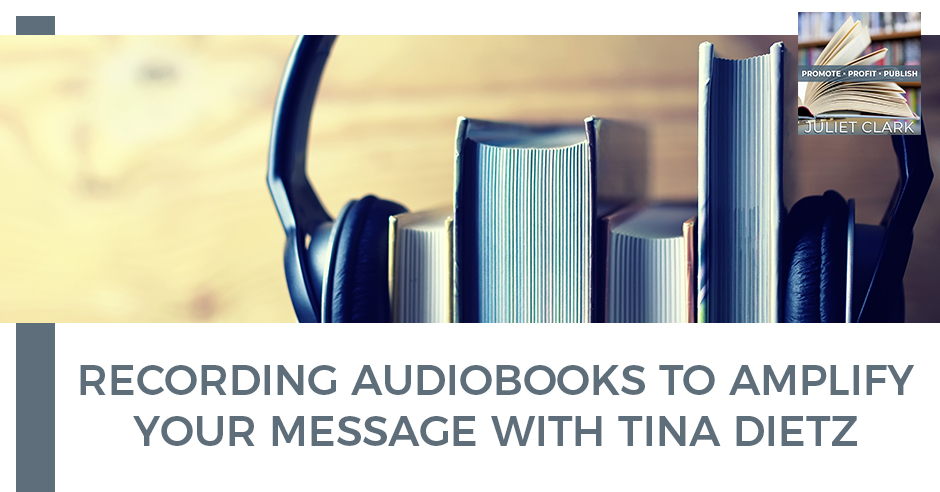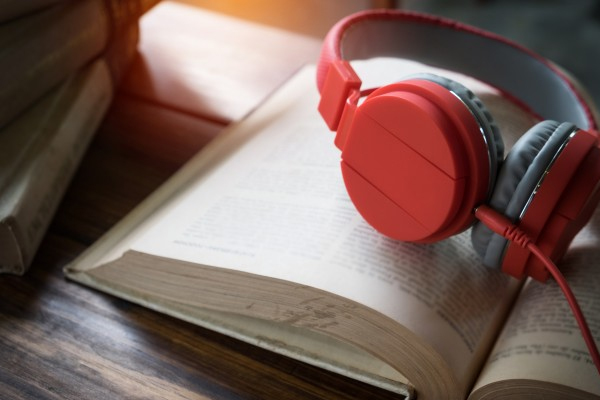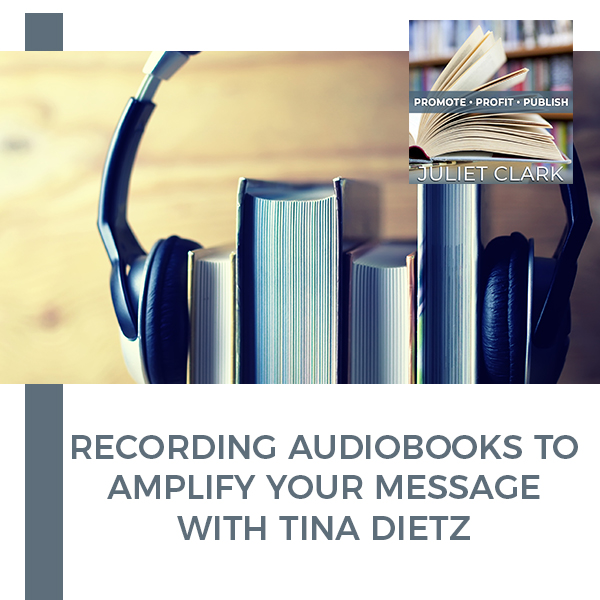
With the hustle and bustle of our daily lives, it can be easy to understand why more and more people are listening to audiobooks than reading in print. A study shows that those who listen to audiobooks could finish more than a dozen books a year while those who read regular books only finish an average of fewer than four books. Taking us deep into the world of audiobooks, Juliet Clark sits down with award-winning and internationally acclaimed speaker, audiobook publisher, podcast producer, and vocal leadership expert, Tina Dietz. Here, Tina shares with us some of the big mistakes people make when doing audiobooks, the process of recording them, and the ways we could use them to build an audience, become a speaker and consultant, and more. Follow this conversation to learn more about audiobooks as a tool to amplify your message.
—
Watch the episode here
Listen to the podcast here
Recording Audiobooks To Amplify Your Message With Tina Dietz
Before we get started with our guest, I want to remind you to go over to YouTube and subscribe to us, Super Brand Publishing. Don’t forget to go over and take our Promote Profit Publish quiz at PromoteProfitPublishQuiz.com. Find out if you’re ready to publish. Do you have the visibility? Are you going to have a real bestseller or a flop? Lastly, you’re reading. If you have good things to say, and if you only have good things to say otherwise, go away. We’d love to invite you over to iTunes and leave us a review. We only want good ones. If you’re reading all the time, you’re bingeing it, please tell us what you think of it.
Our guest is going to be a little bit different and interesting for those of you who want to do audiobooks. Tina Dietz is an award-winning and internationally acclaimed speaker, audiobook publisher, podcast producer, and vocal leadership expert who’s been featured on media outlets, including ABC, Inc.com, Huffington Post, and Forbes. Tina’s first podcast, The Start Something Show, was named by Inc. magazine as one of the top 35 podcasts for entrepreneurs.
In 2016, Tina was the recipient of the Evolutionary Business Council MORE Award. In 2017, she received the award for Outstanding Audio Company from The Winner’s Circle. She is also a member of the EBC leadership body and a founding member of the Forbes Coaches Council. Tina was also the lead interviewer in the podcasting documentary The Messengers and the featured film. She splits her time between the US and Costa Rica, where she’s part of the leadership team building at the community of conscious leaders called Vista Mundo. Welcome, to the show. Tell us a little bit about how you got into audiobooks because people are listening to them more than ever now.
I had been coaching and consulting for a long time and building businesses internationally. I have a deep and abiding love of anything involving a microphone. I had a paid hobby as a voice actor. I ended up taking some narration classes through Pat Fraley who’s one of the best in the industry for training in audiobook narration. I learned about the industry as well and had that chocolate and peanut butter moment where I was like, “I know all of my colleagues, all of my clients are producing and publishing books for their businesses and bestseller campaigns, but I don’t think anyone’s doing audiobooks. Why?” That led me into a rabbit hole because in learning about the industry, I was learning the fastest growing space in publishing.
This is going back many years and no one was talking about audiobooks then. Things had gone digital not that long before and the merger of Audible and Amazon had happened. It took me a couple of years to come around to offering the services, but I piloted some done for you audiobook services at a conference to see what the reception would be like, and within a year it took over 75% of my company. Between that and the podcasting, which I was already involved with, and I was already involved with coaching people around having their voice be their instrumental leadership, it all came together into a beautiful, microphone-based whole deal.
I’m an avid audiobook reader. My friends make fun of me because they’re like, “What are you reading now? How do you have much time to read?” I also run about 10 to 12 hours a week and I listen on 1.75. Everybody who listens to audiobooks tells me the same thing. I’m having a conversation and they’re like, “Why are they talking so much faster than you?” I know that audiobooks are widely used. My particular thing is exercise, but a lot of people who commute don’t watch TV and things like that. I heard a statistic that more people finish audiobooks than they do regular books. Is that true?
There's a difference between doing something and doing it well. Share on XYes. The average audiobook listener will finish more than a dozen books a year whereas folks in the US finish fewer than four books a year in the print or eBook or whatever. Audiobook listeners tend to inhale them like potato chips.
Once upon a time, I wrote How to Write A Book in 30 Days which I never released into print but I recorded it. I thought it would be super easy peasy and that’s what you and I are talking about. It’s not easy. What are some of the big mistakes that people make?
First of all, I want to preface that I don’t want to scare you all from the idea of doing an audiobook. Like anything else, there’s a difference between doing something and doing it well. You can launch a podcast in a day or two but can you do it well? Can you write a book in 30 days? Sure. Can you do it well? That’s the distinction we’re looking for here. Can you record your own audiobook? Absofreakinglutely. Can you do it well? Here’s what you need to know. Mistakes that people make are jumping in without doing the research. Podcasts are different from audiobooks. I get a lot of podcasters, I get a lot of public speakers, a lot of experts who say, “I do a lot of speaking so it will be easy for me to do my audiobook.” It is not the same animal.
Audiobook narration is a different skillset because you are reading and you are speaking and performing at the same time. That requires different parts of your brain to be active. It also requires different technical requirements. You can get away with all kinds of stuff on podcasting like I’m doing right now. I’m on a headset microphone. I could not do that with an audiobook. You’re in a big open room, you could not do that with an audiobook. There are different levels of quality audio and things having to do with stuff called like noise floor and decibels, megahertz, and bit rates. All of these technical things that you need to know upfront if you’re going to do it on your own or you need to know enough to be dangerous if you’re going to hire somebody to help you with it.
We’ve had books come to us where I’ve had a publisher, friend, or a colleague who went and produced their audiobook on their own, and yes, they worked with a producer but, “We need it published. Can you handle the files, the publishing and the distribution?” “Yes.” Inevitably, even with people who claim to have produced 10, 12, 15 audiobooks, will end up with issues with the files. They’re formatted wrong or there’s not enough room noise at the beginning or end. They haven’t included the right elements that are required by Audible or other platforms. There’s a myriad of T’s that need to be crossed and I’s that need to be dotted that in other forms of audio, you don’t have to do. That’s important and probably the biggest set of mistakes that people make and not being prepared in the first place to get the audiobook done.
I thought, “I’m going to go to my friend’s studio and I’m going to knock this thing out in a day. It’s only like 50 pages.” It wasn’t that easy. We ended up breaking it into chapters. These are actual real voice actors who have studied breathe. That was my biggest thing. Can you talk about that?
Everything comes down to breathing in terms of vocal performance. That’s the number one thing. The more that your stress level goes up, or the more concentration that’s needed, the more your breath gets impinged upon. If you have not read your book out loud, it’s going to feel like a foreign object in your mouth that you are like, “How did I write this sentence?” You feel like you’re wrapping your face around the words and it feels weird. Going into a studio is certainly an option with an audio engineer or a director. We did use to produce our author’s audiobooks that way by hooking them up with local studios.

Recording Audiobooks: The average audiobook listener will finish more than a dozen books a year, whereas those who read in print finish fewer than four books a year.
Then I would train them personally before going into the booth because they’re not going to train you. They’re not going to show you the technique ahead of time. They’re not going to show you mic technique necessarily. They might give you a little bit. They might help you catch your mistakes but an audio engineer is not the same as an audiobook director. They’re two totally different things. One is about performance, the other one is about sound quality. Even if you get good sound quality working with an audio engineer in the studio, you’re not necessarily going to be directed through the process which is where we come into the things like phrasing, performance, energy, and the consistency of your sound.
Most people don’t realize they sound different in the morning than they do in the evening. You sound different at the beginning of a three-hour session than at the end of a three-hour session. If you can’t maintain that energy, your audiobook is going to sound inconsistent. That’s part of the process and it’s hard to hear on your own. You also can’t hear most of the time if you’re making any weird repetitious patterns with your voice. A very common is something called uptalk. Uptalk is when you sound like you’re ending your sentences with a question. It happens a lot when you’re reading lists and it makes you sound like you don’t know what you’re talking about, especially with nonfiction, which is our wheelhouse.
We have people who are incredible experts and they come off as uncertain when they start reading their book, because there’s this subconscious thing that happens that makes you question, “Is it okay? Do you understand me? Is the subconscious message that’s being broadcast?” Instead of, “He picked up a paper, a pen, and a mouse.” People will say, “He picked up a paper, a pen, and a mouse?” It sounds totally different. It’s a real authority underminer. It’s all these kinds of things that come into play. Like I said, it’s endless. The most important thing somebody can do is rehearse their book, read it out loud before you go in because that is where the breath is going to get you the most. Those long sentences that you didn’t realize how many commas you used or didn’t use. It’s a beautiful, well-constructed sentence, but it’s a paragraph long.
You’re probably out there thinking right now, how important is that voice? Several years ago, I listened to an Audible fiction book. It was one of those mystery novels with several characters. They brought in different actors for it and one of the people who read the book as one of the characters was the author and she had a list. It was like, “Did anybody tell her she had a list? Why didn’t these people say something?” It was such a turnoff. I didn’t finish the book. It was incredibly odd. It is important that you have the right voice on there. You do a lot of audiobooks where people read their own books.
About 80% of our books are still professionally narrated because most of the folks we work with are incredibly busy. What we find is that there are two schools of thinking on narrating your own audiobook. It would be great if you’re using that book to build an audience, you’re building it in all platforms as a speaker, as a consultant, and all of those kinds of things. In that sense, is it important that your voice be on it? Yes, but if you’re doing a memoir counterintuitively and especially if it has multiple characters like people in your family, and things like that. Most of the time we don’t have people do their own memoirs because there are multiple characters in the book. Also, because memoirs tend to be incredibly emotional for the authors who are reading them.
The third reason is that we don’t necessarily see a difference in the sales numbers on the backend. That’s a key factor because if your time is super valuable, there’s an opportunity cost when you do your audiobook. When we do audiobook packages, we try to keep the investment in it similar either way for people. People have to decide where their time is best used and sometimes your voice isn’t the best voice to use in terms of the quality of your voice. There are brilliant people out there who you might want to hear for 45 minutes doing a keynote, but you don’t want to hear for eight hours in an audiobook.
Audiobook narration is a different skill set because you read, speak, and perform at the same time. Share on XWhat you’re saying is Mike Tyson should not read his own book?
I would prefer not. We could let him do the introduction. We could do that.
I have heard people do their introductions. I read a book where the introduction and the summary were done by the author and the rest was narrated by a professional. I thought that was a good touch with it as well. When you’ve got this microphone and it’s super sensitive. One of the things I noticed when I recorded was, I pop like I was puffed. I was breathing but I didn’t understand it until I heard it. Is that common?
Yes. They’re called plosives. Your P’s, a little less for B’s and T’s. What happens is that the breath hits the wiring in the microphone and it makes this sound wave pop in either end. If you’re looking at it visually, you’ll see a big spike, and plosives are a problem. That’s why most professional mics will have a screen in front of them. It’s something that also in voice acting that you do learn to control is your plosives. The other thing that happens a lot is mouth noise, which is horrifying. I’ve heard a couple of audiobooks narrated by the author where they’ve got a lot of mouth noise. I would rather listen to someone chewing than hear that. That’s something that has to be addressed.
Sometimes it’s dry lips and they need Chapstick. Sometimes they need a sip of water. They’ve got a dry mouth, dry throat, and a couple of different things. Sometimes, if you walked into a studio, they’d have a bowl of apples or a bowl of green apples in their green room and one of the reasons is because the citric acid from the apples or some chemical compound in the apples, if you take a bite and chew it, it helps thin out your saliva. You don’t get as much as the mouth noise on the microphone. Also, things like jewelry or rushly clothing. The microphone will pick up everything.
Can you get those? You mentioned you were listening to it. Did they not take it out of the book? Can you take those things out?
You really can’t take out the mouth noise because it’s part of the speaking. You have to get the take without the mouth noise but you can fix plosives usually. There’s only so much studio magic you can do in postproduction without making somebody sound mechanical. You can filter things and do all kinds of stuff but we want to get as much of the natural voice in there as possible because as you start to add technology on top of the voice, it starts to strip away some of the layers of humanity that make the book wonderful and that make that connection with the listener great.

Recording Audiobooks: There’s only so much magic you can do in post-production without making somebody sound mechanical.
Here’s another downfall that you and I talked about which is self-publishing. When we do our books, we get the first proof back or the first draft, and then you start making corrections. Our authors always complain, “This is tedious.” You have to do that on audio too. How involved is that?
This is why we do full direction with our author’s audiobooks. We’re able to remote into people’s home offices and make sure they have a good audio quality setup. You don’t need a super expensive microphone. The mic we recommend is about $120. We make sure that you’re in the right space to do it in your home or your office and then we have a director who comes, remotes in and does all the recording for you. That minimizes the number of pickups that get made. When we go back then and our editors will listen back to the book and they’ll proof the book as they’re editing.
That proofing process is the process of picking up the mistakes in the book. There’s always got to be a few even with this process that we use. Those get put into a spreadsheet, and then you have to schedule another recording session to do those pickups. Those have to be done in a specific way because they have to be spliced into the original audio seamlessly. You have to be in the same place, you want to record at the same time of day. You want to make sure that your voice hasn’t changed significantly and then you want to have that same energy.
You have to listen to the way that you did it before and then do it correctly this time. This is why we record the pickups with our authors as they go. It makes things a lot easier. All you have to do is focus on the performance. If you’re doing this on your own and you also have to run the tech, make sure that your room noise is right, and that you’re starting and stopping, and you’re monitoring your own mistakes at the same time. Every layer of concentration that that takes makes it exponentially more difficult as you go along. Can you do it? Yes. Do I recommend it? No.
I hope all of you reading who complained about that edit on your book must hear that because that edit is nothing compared to trying to match a voice and do all of that. A lot of people who record books take hours, how do you keep your voice in good shape? This is not something you’re used to doing. I imagine you’d start to get hoarse after a few days.
You want to split it up. A lot of audiobook narrators don’t record for more than three hours a day. Some people go longer. Their instrument is to a point where they feel comfortable doing five hours of recording a day but that’s rare. It’s much more common for audiobook narrators to do three hours a day on any particular book before your voice starts to get tired from that continual strain. We don’t block anybody out for longer than a three-hour recording session, more often than not it’s two to keep that voice quality.
The most important thing somebody can do is rehearse their book and read it aloud before going in. Share on XWe test that out with folks. That first session, we usually block three hours and then see how they do. If their energy starts to drop, we go, “There’s your limit. Let’s stop there and then we’ll pick it up the next day.” We usually block out 2 or 3 hours a day over the space of a week depending on how long the book is. For professional audiobook company like ours, every finished hour of audio takes five hours to produce. You have to keep that in mind between the recording, the proofing, the editing, the mastering, the pickups, and all of that. There’s a 45-hour process involved with that.
You mentioned to me that usually, that hour contains an X amount of words.
A finished hour of audio is equal to about 10,000 print words. If you’re ever looking for how much do audiobook cost to produce? Audiobook cost usually based on the word count of the book is and not how many pages it is because you’ve got font sizes and layouts and all kinds of stuff. For example, a 50,000-word book is about a five-hour audiobook.
Where can we find out more about you and what you do if they’re thinking about putting an audiobook together?
You can check out TwinFlamesStudios.com. That’s the name of my company and we have all kinds of audiobook samples up there as well as the podcasts that we work with and launch for companies. The whole point is to amplify people’s messages around the world. Podcasts, audiobooks, and books, in general, are low hanging fruit for people to be able to start to get to know people, start to get to know leaders and also to start to make changes in your life. They’re one of the easiest and most accessible ways for transformation to happen on the planet. That’s what we’re up to.
Thank you so much for being on. I hope she didn’t dissuade you but my point is it’s harder than it looks.
It can be easier too. We’re here to help. Thank you so much, Juliet.
Important Links
- Super Brand Publishing – YouTube
- PromoteProfitPublishQuiz.com
- iTunes – Promote, Profit, Publish
- Tina Dietz
- Inc.com
- The Start Something Show – iTunes
- TwinFlamesStudios.com
About Tina Dietz
 Tina Dietz is an award-winning and internationally acclaimed speaker, audiobook publisher, podcast producer, and vocal leadership expert who has been featured on media outlets including ABC, Inc.com, Huffington Post, and Forbes. Tina’s first podcast, The Start Something Show, was named by INC magazine as one of the top 35 podcasts for entrepreneurs.
Tina Dietz is an award-winning and internationally acclaimed speaker, audiobook publisher, podcast producer, and vocal leadership expert who has been featured on media outlets including ABC, Inc.com, Huffington Post, and Forbes. Tina’s first podcast, The Start Something Show, was named by INC magazine as one of the top 35 podcasts for entrepreneurs.
In 2016, Tina was the recipient of the Evolutionary Business Council MORE award and in 2017 she received the award for Outstanding Audio Company from The Winner’s Circle. She is also a member of the EBC leadership body and a founding member of the Forbes Coaches Council. Tina was also the lead interviewer in the podcasting documentary “The Messengers” and featured in the film.
Tina splits her time between the US and Costa Rica where she’s part of the leadership team building a community of conscious leaders called Vista Mundo.
Love the show? Subscribe, rate, review, and share!









Leave A Comment